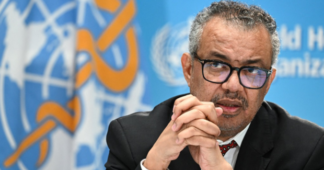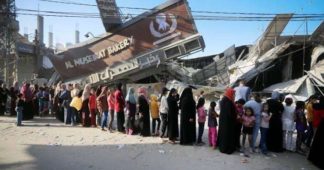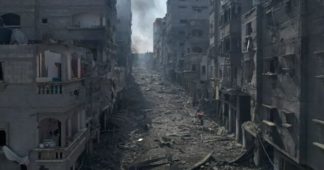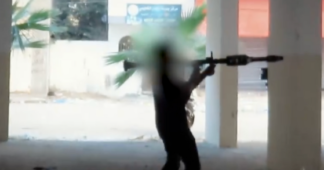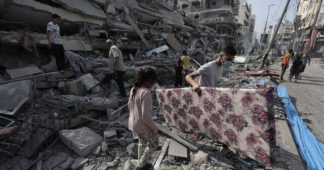Dec 5, 2024
Around 60,000 Palestinians in the northern Gaza Strip are living in catastrophic conditions under the Israeli siege that has been ongoing for more than 60 days, according to a spokesperson for UNRWA (UN Relief Agency for Palestine Refugees).
“This is an absolutely unprecedented level of tragedy. It’s an unprecedented humanitarian crisis,” said Jonathan Fowler, UNRWA’s Senior Director of Communications, in an interview with the Anadolu news agency.
❝Bu kuşatılmış bölgedeki insanlar açlıktan ölecek❞
UNRWA Kıdemli İletişim Yöneticisi Jonathan Fowler, İsrail’in yoğun saldırıları ve kuşatması altında bulunan Gazze Şeridi’ndeki insani yardımlarla ilgili duruma ilişkin AA’ya değerlendirmelerde bulundu https://t.co/rGl3HMTl07 pic.twitter.com/0sPCuSjI32
— Anadolu Ajansı (@anadoluajansi) December 4, 2024
Describing the situation as “perfectly catastrophic” Fowler said, “Everywhere you look all the indicators are completely disastrous, the lack of medicine, the lack of food, the lack of drinking water, the lack of access, the constant displacement, the death, the destruction, the missing people.”
Almost two million people in Gaza were “entirely reliant on humanitarian aid to survive,” the spokesperson stressed.
“This is a man-made disaster and it’s absolutely unconscionable that this continues,” Fowler emphasized.
Reduced Entry of Trucks
He explained that “it’s not complicated to understand that if you need 500 trucks of food and other supplies a day and you’re only getting 70, 80, 90 – that is why people are suffering so severely.”
Palestinians in northern Gaza “are completely cut off,” Fowler continued, “They have no food, they have no water, there’s not even any ambulances.”
“In Gaza, ensuring the #RightToFood is not just about meeting immediate needs. It is about safeguarding human dignity, preventing famine from spreading and now laying the groundwork for rebuilding a resilient agrifood system.”
🎙️@BethBechdol, Deputy Director-General, @FAO. pic.twitter.com/hQr77YILRe
— FAO in Emergencies (@FAOemergencies) December 5, 2024
Overall the north is one of the most affected areas of the entire Gaza Strip, said the spokesperson, “that pocket is the sort of epicentre of the current humanitarian tragedy and that this again is a reason why there has to be access for humanitarians and there has to be an immediate ceasefire.”
He warned due to the “absolute level of tragedy there, people will be dying of hunger in those besieged areas,” as there is “nothing to eat.”
“The responsibility to protect aid workers and aid supplies falls upon the occupying power and that is the state of Israel. And so everything must be done by the Israeli authorities to ensure that aid flows safely into Gaza,” Fowler stated.
Ongoing Genocide
Flouting a UN Security Council resolution demanding an immediate ceasefire, Israel has faced international condemnation amid its continued brutal offensive on Gaza.
Currently on trial before the International Court of Justice for genocide against Palestinians, Israel has been waging a devastating war on Gaza since October 7.
According to Gaza’s Ministry of Health, 44,580 Palestinians have been killed, and 105,739 wounded in Israel’s ongoing genocide in Gaza starting on October 7, 2023.
Moreover, at least 11,000 people are unaccounted for, presumed dead under the rubble of their homes throughout the Strip.
Israel says that 1,200 soldiers and civilians were killed during the Al-Aqsa Flood Operation on October 7. Israeli media published reports suggesting that many Israelis were killed on that day by ‘friendly fire’.
Palestinian and international organizations say that the majority of those killed and wounded are women and children.
Millions Displaced
The Israeli war has resulted in an acute famine, mostly in northern Gaza, resulting in the death of many Palestinians, mostly children.
The Israeli aggression has also resulted in the forceful displacement of nearly two million people from all over the Gaza Strip, with the vast majority of the displaced forced into the densely crowded southern city of Rafah near the border with Egypt – in what has become Palestine’s largest mass exodus since the 1948 Nakba.
Later in the war, hundreds of thousands of Palestinians began moving from the south to central Gaza in a constant search for safety.
We remind our readers that publication of articles on our site does not mean that we agree with what is written. Our policy is to publish anything which we consider of interest, so as to assist our readers in forming their opinions. Sometimes we even publish articles with which we totally disagree, since we believe it is important for our readers to be informed on as wide a spectrum of views as possible.
